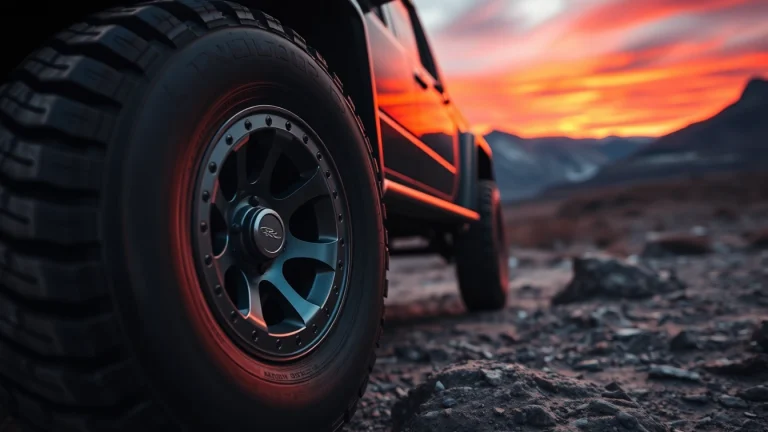
Choosing the Right Off Road Wheels: A Comprehensive Guide for Every Adventurer
Understanding Off Road Wheels
Off road wheels are a crucial component for any vehicle destined to conquer rugged terrains and challenging landscapes. These wheels are specifically designed to withstand harsh conditions while providing maximum traction and performance. In contrast to standard wheels, off road wheels often feature enhanced durability, wider widths, and specific construction materials tailored to such demanding environments. Choosing the right off road wheels can make a significant difference in your off-road journey, whether you are traversing rocky paths, muddy trails, or sandy dunes.
What Makes Off Road Wheels Unique?
The uniqueness of off road wheels lies in their design and performance characteristics. Unlike conventional wheels which prioritize aesthetics or lightness for street driving, off road wheels are engineered for resilience and capability in extreme conditions. Key attributes include:
- Increased Load Ratings: Off road wheels are constructed to handle the significant weight and stress during off-road activities, ensuring they do not warp or break under pressure.
- Wider Offsets: The wider offset provides enhanced stability and control on uneven surfaces, allowing for better handling and maneuverability.
- Beadlock Options: Many off road wheels include beadlock technology to secure tires in place, which is critical in extreme off-road situations where tire slippage can occur.
Popular Off Road Wheel Materials
Choosing the right material for off road wheels is essential for achieving the desired balance of weight, durability, and performance. Common materials include:
- Aluminum Alloy: Lightweight and resistant to rust, aluminum wheels are a popular choice for off road applications. They offer a great blend of strength and reduced weight.
- Steel: Known for their strength and impact resistance, steel wheels can endure tough conditions but are generally heavier than aluminum. They are often used in rugged applications where durability is paramount.
- Forged Wheels: Although more expensive, forged wheels provide superior strength and weight reduction, making them highly desirable for serious off-road enthusiasts.
How to Choose the Right Fit for Your Vehicle
Selecting the right off road wheels involves understanding several critical factors:
- Vehicle Compatibility: Ensure the wheels fit your specific make and model. This involves knowing your bolt pattern, wheel size, and offset requirements.
- Intended Use: Consider the types of terrain you will be navigating. Wheels designed for mud often differ from those intended for street use or rock crawling.
- Size Considerations: Larger wheels can improve the ground clearance of your vehicle but may affect fuel efficiency and handling. It’s essential to find a balance based on your driving needs.
Benefits of Upgrading Your Off Road Wheels
Upgrading to high-quality off road wheels can yield numerous benefits, enhancing both the performance and aesthetic appeal of your vehicle.
Improved Performance on Tough Terrain
Off road wheels are specifically designed to provide traction and stability on challenging landscapes. Their deep tread patterns and robust construction allow them to grip surfaces better than standard wheels. As a result, enthusiasts experience enhanced confidence when tackling steep inclines, rocky terrains, and muddy paths.
Enhanced Aesthetic Appeal
Beyond functionality, off road wheels can dramatically change the appearance of your vehicle. With a wide range of styles, finishes, and designs available, these wheels can express personality and improve the overall look of your truck or SUV, making it stand out on the trails or at car shows.
Long-Term Durability and Maintenance
Investing in off road wheels often means choosing durability over temporary solutions. High-quality wheels are designed to withstand the corrosive effects of mud, dirt, and saltwater, leading to reduced maintenance costs over time. Additionally, they usually come with warranties, providing further peace of mind for their longevity.
Comparative Analysis of Off Road Wheel Brands
The market for off road wheels is bustling with a myriad of brands, each boasting unique features and selling points. A comparative analysis can help guide your purchasing decision.
Top Brands in the Market
Some of the most respected names in off road wheels include:
- KMC Wheels: Known for innovative designs and quality, KMC offers an extensive range of aggressive styles that appeal to off-road enthusiasts.
- Fuel Off-Road: Their cutting-edge designs and robust wheels cater well to performance-oriented drivers, with options for various truck and SUV models.
- Method Race Wheels: Combining strength and performance, Method’s wheels are popular among racers who demand durability without sacrificing weight.
Price Point vs. Quality: What to Expect
When it comes to off road wheels, understanding the relationship between price and quality is crucial. Generally, you can expect:
- Budget Options: These may be less durable and offer less traction but can still serve well for light off-road use.
- Mid-Range Choices: These often balance quality and cost effectively, providing substantial features without breaking the bank.
- Premium Products: Higher-end options offer unparalleled performance, materials, and warranty support, suitable for competitive and serious off-roaders.
Customer Reviews and Recommendations
Researching customer feedback can provide insight into real-world performance and durability. Look for reviews on manufacturer websites, forums, and social media platforms to gain perspective on the strengths and weaknesses of specific brands.
Installation Process for Off Road Wheels
Installing off road wheels is often a straightforward process that any committed car enthusiast can handle with the right tools and guidance. However, there are crucial steps and precautions to consider.
Tools Required for Installation
Before beginning the installation, you will need the following tools:
- Jack and Jack Stands
- Tire Iron or Lug Wrench
- Torque Wrench
- Impact Wrench (optional)
- Safety Gear (gloves and goggles)
Step-by-Step Installation Guide
- Prepare Your Vehicle: Ensure the vehicle is parked on a level surface. Engage the parking brake and loosen the lug nuts on the wheels without removing them completely.
- Lift the Vehicle: Use a jack to raise the vehicle and support it with jack stands for safety.
- Remove Old Wheels: Finish unscrewing the lug nuts and carefully take off the old wheels.
- Install New Wheels: Position the off road wheels on the hub and hand-tighten the lug nuts.
- Lower the Vehicle: Carefully lower the vehicle back to the ground.
- Final Tightening: Using a torque wrench, secure the lug nuts to the manufacturer’s specifications for safety.
Common Mistakes to Avoid During Installation
To ensure a secure and effective installation, avoid these common pitfalls:
- Neglecting Torque Specifications: Failing to follow the manufacturer’s torque specifications may result in stripped nuts or loose wheels.
- Skipping the Break-in Period: New wheels require a break-in period to ensure components settle correctly. Driving at moderate speeds initially is advised.
- Using Incorrect Tools: Ensure you have the right tools for your wheel type to avoid damaging the wheels or vehicle.
Maintaining Your Off Road Wheels
Proper maintenance is vital for prolonging the life of your off road wheels and ensuring optimal performance.
Regular Inspection and Care Tips
Make it a habit to perform regular inspections of your wheels for signs of damage such as cracks, bending, or corrosion. Check for:
- Loose lug nuts or bolts
- Deformed rims
- Adequate tire pressure
How to Clean and Protect Your Wheels
Cleaning off road wheels should involve:
- Rinsing with clean water to remove dirt and debris.
- Using a mild soap and a soft brush to clean between the spokes and nooks.
- Drying the wheels thoroughly to prevent water spots and corrosion.
Consider applying a protective coating designed for off road wheels to guard against environmental damage.
When to Seek Professional Help
If you notice persistent issues with your wheels or experience trouble with installation, consulting a professional mechanic can provide invaluable insight and solutions. They have the tools and experience needed to thoroughly examine and repair wheel problems that may be beyond the average car owner’s expertise.


